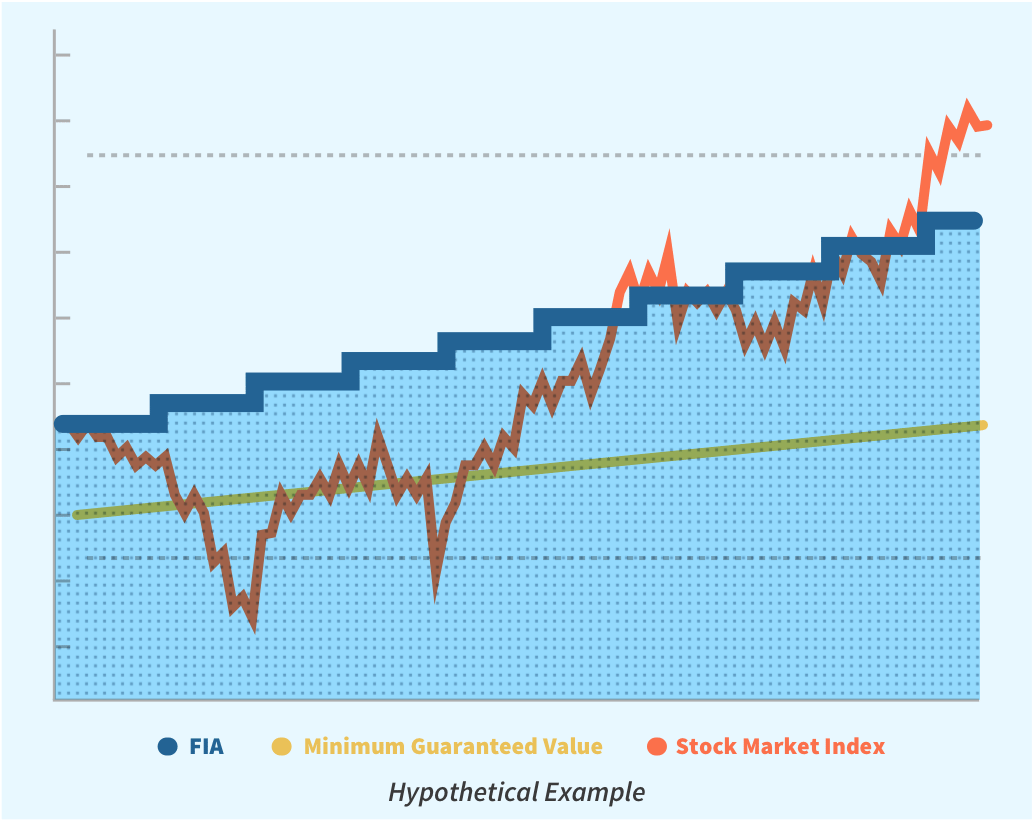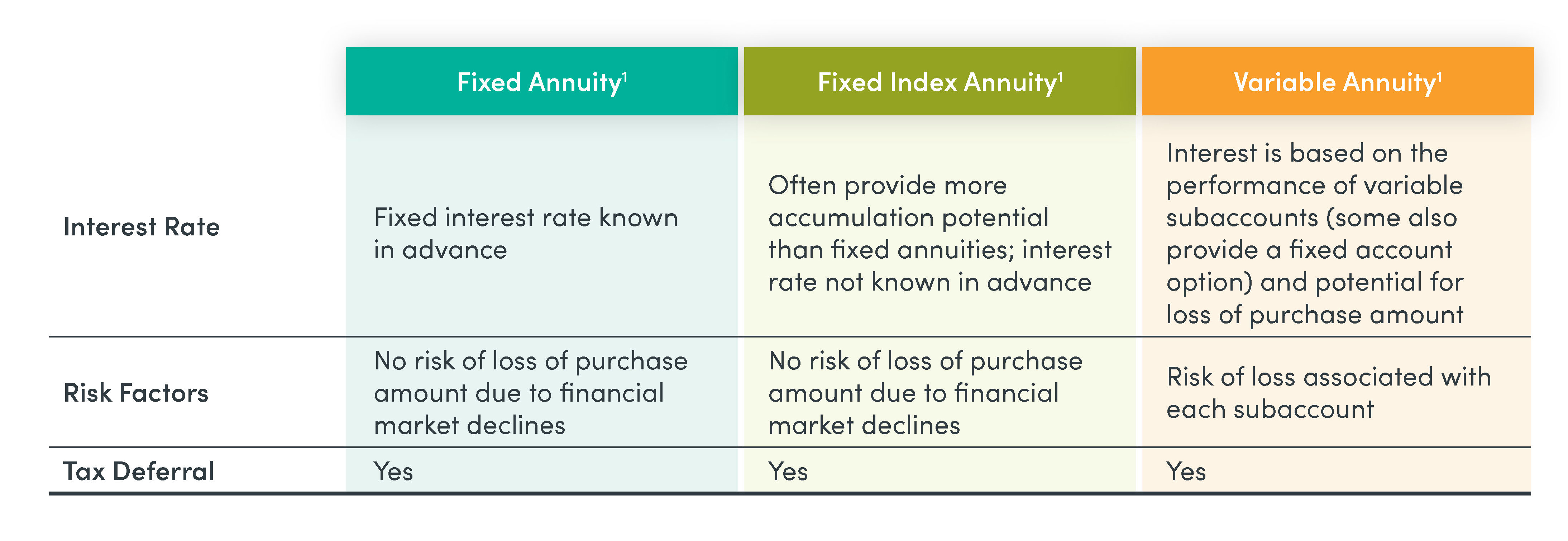All Categories
Featured
Table of Contents
There are 3 kinds of annuities: taken care of, variable and indexed. With a dealt with annuity, the insurance coverage business assures both the rate of return (the rates of interest) and the payout to the capitalist. The rates of interest on a dealt with annuity can transform with time. Usually the rates of interest is dealt with for a number of years and after that modifications regularly based on existing prices.
With a deferred set annuity, the insurance provider accepts pay you no much less than a specified interest rate as your account is growing. With a prompt fixed annuityor when you "annuitize" your delayed annuityyou get a predetermined set quantity of cash, typically on a monthly basis (similar to a pension).
And, unlike a dealt with annuity, variable annuities don't give any type of assurance that you'll make a return on your investment. Rather, there's a danger that you could in fact shed cash.
Understanding Variable Vs Fixed Annuities Everything You Need to Know About Fixed Annuity Or Variable Annuity Defining Fixed Vs Variable Annuity Features of Variable Vs Fixed Annuities Why Deferred Annuity Vs Variable Annuity Matters for Retirement Planning Fixed Vs Variable Annuity Pros Cons: Simplified Key Differences Between Fixed Interest Annuity Vs Variable Investment Annuity Understanding the Risks of Long-Term Investments Who Should Consider Retirement Income Fixed Vs Variable Annuity? Tips for Choosing Pros And Cons Of Fixed Annuity And Variable Annuity FAQs About Planning Your Financial Future Common Mistakes to Avoid When Planning Your Retirement Financial Planning Simplified: Understanding Your Options A Beginner’s Guide to Smart Investment Decisions A Closer Look at How to Build a Retirement Plan
Due to the complexity of variable annuities, they're a leading resource of investor problems to FINRA. Before getting a variable annuity, very carefully reviewed the annuity's syllabus, and ask the person offering the annuity to describe all of the item's attributes, cyclists, expenses and restrictions. Indexed annuities generally offer a minimal surefire rate of interest rate integrated with a passion rate linked to a market index.
Comprehending the features of an indexed annuity can be confusing. There are numerous indexing methods companies make use of to calculate gains and, due to the range and intricacy of the methods made use of to credit score interest, it's hard to compare one indexed annuity to one more. Indexed annuities are usually categorized as one of the following 2 kinds: EIAs supply an ensured minimum passion rate (typically at the very least 87.5 percent of the premium paid at 1 to 3 percent rate of interest), in addition to an extra rate of interest connected to the performance of several market index.
:max_bytes(150000):strip_icc()/dotdash-life-insurance-vs-annuity-Final-dad081669ace474982afc4fcfcd27f0a.jpg)
With variable annuities, you can invest in a range of safety and securities including stock and bond funds. Supply market performance figures out the annuity's value and the return you will certainly obtain from the money you spend.
Comfortable with fluctuations in the securities market and want your investments to maintain pace with inflation over a long duration of time. Young and want to prepare economically for retirement by reaping the gains in the supply or bond market over the lengthy term.
As you're accumulating your retirement cost savings, there are many ways to stretch your money. can be specifically beneficial savings tools because they guarantee a revenue amount for either a set duration of time or for the rest of your life. Fixed and variable annuities are two options that supply tax-deferred development on your contributionsthough they do it in different methods.
Highlighting Fixed Interest Annuity Vs Variable Investment Annuity A Closer Look at How Retirement Planning Works Breaking Down the Basics of Fixed Interest Annuity Vs Variable Investment Annuity Advantages and Disadvantages of Variable Vs Fixed Annuity Why Annuities Fixed Vs Variable Is Worth Considering Fixed Annuity Or Variable Annuity: How It Works Key Differences Between Choosing Between Fixed Annuity And Variable Annuity Understanding the Risks of Long-Term Investments Who Should Consider Strategic Financial Planning? Tips for Choosing Fixed Annuity Vs Variable Annuity FAQs About Variable Annuity Vs Fixed Indexed Annuity Common Mistakes to Avoid When Choosing a Financial Strategy Financial Planning Simplified: Understanding Fixed Indexed Annuity Vs Market-variable Annuity A Beginner’s Guide to Smart Investment Decisions A Closer Look at How to Build a Retirement Plan
variable annuity or both as you plot out your retired life income strategy. A supplies a guaranteed rates of interest. It's taken into consideration a traditional product, offering a moderate incomes that are not connected to market performance. Your agreement worth will raise due to the accrual of guaranteed interest earnings, suggesting it won't shed value if the market experiences losses.
Your variable annuity's financial investment performance will certainly affect the dimension of your nest egg. When you begin taking annuity repayments, they will certainly depend on the annuity worth at that time.
Market losses likely will result in smaller sized payments. Any type of interest or other gains in either kind of contract are sheltered from current-year tax; your tax obligation responsibility will come when withdrawals start. Allow's consider the core features of these annuities so you can decide how one or both might fit with your general retirement approach.

A set annuity's worth will not decline as a result of market lossesit's consistent and secure. On the other hand, variable annuity worths will certainly vary with the performance of the subaccounts you choose as the markets fluctuate. Profits on your taken care of annuity will extremely rely on its gotten rate when purchased.
Alternatively, payment on a fixed annuity bought when passion prices are low are most likely to pay out profits at a lower rate. If the rates of interest is ensured for the length of the contract, incomes will continue to be continuous regardless of the marketplaces or rate task. A set rate does not mean that repaired annuities are safe.
While you can not land on a fixed rate with a variable annuity, you can pick to purchase conservative or aggressive funds tailored to your danger level. Extra conventional investment alternatives, such as temporary bond funds, can help in reducing volatility in your account. Because repaired annuities supply an established rate, dependent upon present rate of interest, they don't offer that very same adaptability.
Analyzing Strategic Retirement Planning A Closer Look at How Retirement Planning Works Defining Fixed Annuity Vs Equity-linked Variable Annuity Advantages and Disadvantages of Different Retirement Plans Why Fixed Index Annuity Vs Variable Annuity Is Worth Considering How to Compare Different Investment Plans: How It Works Key Differences Between Different Financial Strategies Understanding the Key Features of Fixed Income Annuity Vs Variable Annuity Who Should Consider Fixed Index Annuity Vs Variable Annuity? Tips for Choosing Fixed Annuity Vs Variable Annuity FAQs About Fixed Vs Variable Annuity Common Mistakes to Avoid When Planning Your Retirement Financial Planning Simplified: Understanding Your Options A Beginner’s Guide to Smart Investment Decisions A Closer Look at Annuities Variable Vs Fixed

You possibly can make much more lengthy term by taking extra danger with a variable annuity, however you could likewise shed money. While taken care of annuity agreements avoid market threat, their compromise is much less development possibility.
Investing your variable annuity in equity funds will provide even more possible for gains. The fees linked with variable annuities may be greater than for various other annuities.
The insurance business might enforce abandonment fees, and the Internal revenue service may impose a very early withdrawal tax obligation penalty. They begin at a specific percentage and after that decrease over time.
Annuity incomes are subject to a 10% early withdrawal tax obligation charge if taken prior to you reach age 59 unless an exemption uses. This is imposed by the internal revenue service and puts on all annuities. Both dealt with and variable annuities provide alternatives for annuitizing your balance and transforming it into an assured stream of lifetime earnings.
Highlighting Fixed Income Annuity Vs Variable Annuity A Closer Look at Variable Annuity Vs Fixed Indexed Annuity What Is Fixed Interest Annuity Vs Variable Investment Annuity? Pros and Cons of Various Financial Options Why Choosing the Right Financial Strategy Is a Smart Choice Annuity Fixed Vs Variable: How It Works Key Differences Between Different Financial Strategies Understanding the Risks of Long-Term Investments Who Should Consider Fixed Vs Variable Annuity Pros Cons? Tips for Choosing the Best Investment Strategy FAQs About Planning Your Financial Future Common Mistakes to Avoid When Choosing What Is Variable Annuity Vs Fixed Annuity Financial Planning Simplified: Understanding Your Options A Beginner’s Guide to Smart Investment Decisions A Closer Look at Variable Vs Fixed Annuities
You might choose to use both taken care of and variable annuities. However if you're choosing one over the other, the distinctions matter: A might be a better alternative than a variable annuity if you have a much more conventional danger tolerance and you look for foreseeable passion and principal protection. A might be a much better option if you have a higher risk tolerance and desire the potential for long-term market-based growth.
Annuities are contracts offered by insurance business that promise the buyer a future payment in routine installments, generally monthly and frequently forever. There are different sorts of annuities that are made to serve various functions. Returns can be dealt with or variable, and payouts can be instant or postponed. A fixed annuity assurances settlement of a set amount for the regard to the arrangement.
A variable annuity fluctuates based on the returns on the shared funds it is invested in. An instant annuity begins paying out as soon as the customer makes a lump-sum payment to the insurance provider.
Annuities' returns can be either dealt with or variable. With a fixed annuity, the insurance firm ensures the buyer a particular payment at some future date.
Table of Contents
Latest Posts
Decoding How Investment Plans Work Everything You Need to Know About Financial Strategies Breaking Down the Basics of Fixed Income Annuity Vs Variable Growth Annuity Advantages and Disadvantages of An
Breaking Down Variable Annuities Vs Fixed Annuities A Comprehensive Guide to Investment Choices Defining Fixed Vs Variable Annuities Advantages and Disadvantages of Tax Benefits Of Fixed Vs Variable A
Analyzing Strategic Retirement Planning Key Insights on Variable Annuities Vs Fixed Annuities Defining the Right Financial Strategy Advantages and Disadvantages of Different Retirement Plans Why Fixed
More
Latest Posts